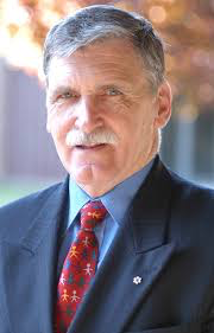
1946 -
A second-generation Canadian soldier, Dallaire was born in the Netherlands. He spent his childhood in Montreal, entered CMR Saint-Jean in 1964, graduated from RMC in 1969 with a Bachelor of Science degree and was commissioned into The Royal Regiment of Canadian Artillery. Subsequently, he attended the Canadian Land Force Command and Staff College, the US Marine Corps Command and Staff College, and the British Higher Command and Staff Course.
Dallaire commanded the 5e Régiment d’artillerie légère du Canada, was Director of Land Requirements for four years, was promoted to Brigadier-General and appointed Commandant of CMR Saint-Jean from 1989 to 1991. He then commanded the 5e Groupe-brigade mécanisé du Canada in Valcartier.
In 1993, Dallaire was given command of the United Nations Observer Mission Uganda-Rwanda (UNOMUR) and the United Nations Assistance Mission for Rwanda (UNAMIR), charged with assisting in the implementation of the Arusha Accords, a peace agreement after three years of civil war between the Rwandan government and the Rwandan Patriotic Front. The Peace Accord broke down and extremists implemented a plan, later confirmed by the International Criminal Tribunal for Rwanda, to rid Rwanda of the Tutsi population.
Dallaire’s Peacekeeping Force, subject to Chapter VI of the Charter of the United Nations, was by mandate forbidden to intervene and ordered to withdraw when the civil war and subsequent genocide commenced in April 1994. His Force was reduced to only a few hundred ill-equipped African peacekeepers and had no mandate to even protect the civilian population at risk of slaughter. In this dire situation, without UN mandate, with most peacekeepers repatriated, Dallaire and his reduced Force, including a staff group of twelve Canadian officers as the sole reinforcements, remained as the only formal UN presence.
Over 800 000 Rwandans perished and almost four million were displaced in three months. Dallaire’s contingent remained in Rwanda, under constant threat, determined to be witnesses of the genocide and protect those who sought refuge. His influence is credited with saving some 32 000 Rwandans from massacre.
Later in 1994, Dallaire was appointed Commander of the 1st Canadian Division and Deputy Commander, Canadian Land Forces. In 1996, he was made Chief of Staff to the Assistant Deputy Minister, Personnel at NDHQ. In 1998, he was promoted to Lieutenant-General and became the first Assistant Deputy Minister, Human Resources (Military). After nearly six months sick leave due to his Operational Stress Injury (OSI), he returned in early 1999 as Special Advisor to the Chief of the Defence Staff on Officer Professional Development, mandated to articulate the reform of the Officer Corps. His draft report was submitted in January 2000. However, his OSI prevented further operational deployment and he was medically released from the Canadian Forces in April 2000.
Dallaire subsequently served on the UN Secretary-General’s Advisory Committee on Genocide Prevention, Special Advisor to the Minister of Veterans Affairs Canada, Advisor to the Minister of National Defence, and Special Advisor to the Minister responsible for the Canadian International Development Agency on matters relating to War Affected Children. During a Fellowship at Harvard University, he researched the use of children as weapons of war.
Dallaire was appointed to the Senate of Canada in 2005 and chaired the Veterans Sub-Committee and co-chaired the National Security and Defence Committee. He resigned in 2014 to continue his life’s work on eradicating the use of child soldiers through the “Romeo Dallaire Child Soldiers Initiative” at Dalhousie University.
Dallaire holds honorary doctorates and fellowships from more than three dozen universities in Canada, the United States and the UK. He is an Officer of the Order of Canada, a Grand Officer of the National Order of Quebec, and Commander of the Order of Military Merit. He was awarded the Meritorious Service Cross and made an Officer of the Legion of Merit of the USA.
Among numerous awards, Dallaire received the United Nations Association of Canada’s Pearson Peace Medal, the Vimy Award, the Arthur Kroeger College (Carleton University) Award for Ethics in Public Affairs, the United States Holocaust Memorial Museum Elie Wiesel Award, the Canadian Medical Association Medal of Honour, the Canadian Psychological Association Humanitarian Award and the Harvard University Humanist Award.
Dallaire’s writings include two best-selling books. Shake Hands with the Devil: The Failure of Humanity in Rwanda, won the Governor General’s Literary Award for Non-Fiction in 2004 and the Shaughnessy Cohen Prize for political writing awarded by the Writers’ Trust of Canada. It provided the basis for an Emmy Award-winning documentary as well as a major motion picture of the same name. It has also been entered into evidence in war crimes tribunals trying the perpetrators of the Rwandan genocide.
His most recent book, They Fight Like Soldiers, They Die Like Children: The Global Quest to Eradicate the Use of Child Soldiers introduces the child soldier phenomenon and solutions to eradicate this horrific abuse of children.
Citation on plaque:
Soldier, Humanitarian, Author, Senator, Activist